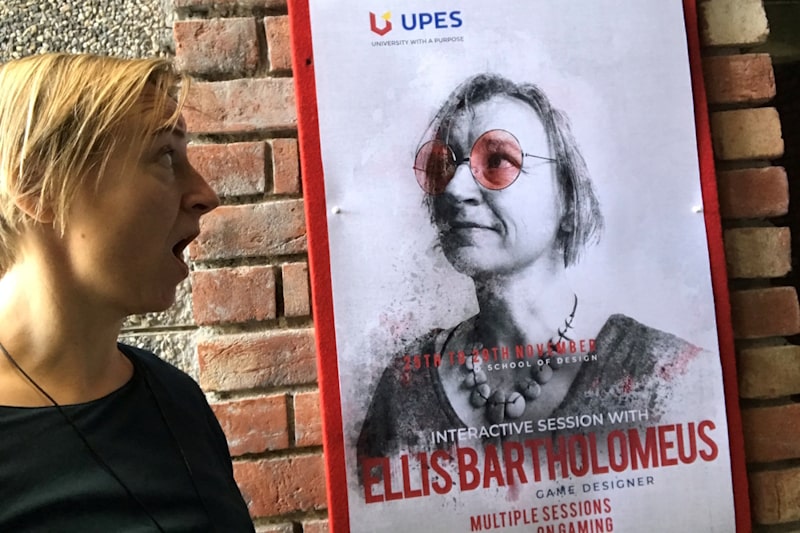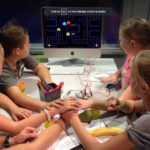In my article on the Magic Game Circle as a model, I mentioned cheating to illustrate the magic circle and it’s strong or weak appearance and it’s vulnerable appearance. Realizing the importance of cheating in games, I wish to explore on this game mechanic more thoroughly based on a real life experience inside the magic game circle.
I attended the 44th ISAGA conference Stockholm in summer 2013. Aside from a huge amount of research and theory on simulation, learning and gaming, we also played games. One game I attended as a player was ‘Harvest’. 4 teams, 3 members each 1 boat, one ocean including a maximum of 50 fish. Every team is allowed to sent a boat with a request for an amount fish to catch. If enough fish are in the ocean, the amount will be caught with random value. The four teams immediately decided to cooperate to not empty the see, since each round all fish left will be multiplied in the sea to a maximum of 50 fish….
In our team* we started talking about the purpose of the game, and the need to cooperate and trust each other. Round 1 we all agreed on catching 6 fish, to make sure to optimize the regenerating condition of the ocean (four times six makes 24. 26 fish would be left and than ‘doubled’ too 50 fish). Round 2 our team realized the missing out on the 1 extra fish ‘left over’, so we suggested to take turns for each team to fish for 7 fish instead of 6. Then soon we realised the cost of fishing is a factor to take in account, so to save costs we better take turns in fishing, 3 boats stay home and 1 boats sails each round. Every team agreed. In fourth round already there appeared to be a little amount of fish fish, and a lot discussion on cheating started…All teams where showing and blaming other teams on cheating (in a very clever and direct way) and our team kept communicating and looking for solutions in the most socialistic, democratic, transparent and honest way. We decided on no fishing collectively for a while. The facilitator decided to stop the game in round 7. We did a remarkable good job, since we had a full ocean: WE (the four teams together) WON!
But then…. in the debriefing appeared all other teams had been cheating, and lying, and were intending to empty the ocean if the game would have continued as soon as possible…. I, and my two team members, felt extremely violated!
Some cheated so clever, by showing transparency to gain trust, while withholding the real amount of coins and therefore the amount of fish they really caught, calculating ‘coincidently’ wrongly, just to give the suggestion of being the underdog, etc.
My team-members and I had been discussing during play the concept of good and bad… The discussion was whether people are good at the core and just behave bad (good people + bad action = not indefinite), or evil is latent present in every person (bad action = bad people= definite)… and whether it would be only a matter of time for people to start cheating, for the sake of either boredom, winning, curiosity, challenge, survival or a combination of several.
From then on it was a rollercoaster of emotions. We realized the amount, cleverness, levels of cheating in it’s instant presence! The multi layers of strategies in cooperating with other teams or selfish and ego behavior, the dilemma’s within the teams on the (non) cheat strategy, short term and long term visions where explored and ignored simultaneously.
The debriefing was rather complex on gameplay, abstraction, learning, consequences, dilemma’s and about teamwork. Even culture, strategy, gender, policy and economy passed the revue. Then the transfer of in game learnings to real life…. if cheating (within this game) is obvious and recognised as a necessity, when will I realize in this (or any other) game I having been naif and got feeling stupid…. when should or will I start cheating? In what manner and how much would I cheat? Would I choose to starve instead of cheating in real life or next game? Will I be able to cheat for the ‘purpose’ of the common good? Ís there an individual choice in this at all?
Conclusions, there are many layers in games: content layer (knowledge) – game layer – play/actions layer (skill) and players personal perception and feelings layer, which we are most interested about, because how I felt in this game, made me able to transfer the learnings and decide to use (or not use) these learnings in different contexts: the attitude layer might be the best name for this layer.
- For game research it is important to distinguish all layers to be able to learn to know and describe the dependencies in between all the ingredients inside the magic circle, personalities, actions, behavior, consequences.
- For game design we need to know the layers very well to optimize the player to be immersed inside the layers, a player should not know which layer he is “on” he should get lost in the magic circle, be immersed in play. To integrate and unite the different layers in games would be the ultimate challenge.
- A player should not know/realise about the layers and their distinction should not be aware he is about to learn how to fish, but experience loving the ocean and all it’s intriguing aspects to explore and satisfy intrinsic hunger and curiosity to learn how the world really works and how to cope with life, as if coincendently)
- (I know this sounds ambitious, but I have seen this happen very often, since I love to watch play, not to play games, but sometimes I really need to get into the Magic Game Circle myself to experience and learn from it’s great, hurtfull, painful qualities
Two days after playing ‘harvest’… suffering the dilemma on being naif and ‘good’ or becoming bad, stacking up all other situations of being violated by others cheating… it hit me like a bomb…. I had been ‘cheating’ too!
My intention at the start of the game was to set a common perfect goal… and as a game-designer and DIY game researcher… I wanted to beat the game itself (and the game designer with it)! I wanted to prove the game not being a ‘normal’ player, not following any of the existing or walked paths, but reinvent a scenario/path in this game. With full and utterly complete transparency in al teams starting from the first second on, we would have been able to maximize the fishing and profit but taking turns to fish, optimize the oceans competencies, learning the dynamics of chance in all profit from the fishing, sharing all profits equally and live happy ever after all together forever and ever….
But we would have not been playing a game, not be in a magic circle, but instead just simulating a perfect world instead.. who would want that?
Wauw, what a learning moment, which can even be described as enlightening.
Cheating is as much part of the game and should be facilitated while designing games, since these are the accelerating tools to learn the game rules and the context, cheating emphasises the player-element and facilitates the player to learn transcendental.
Inside the magic circle we need to experience where the circle starts and ends, we very often do know this concensiously when we wish to beat someone in a game, we know we are not beating him for real, but still the transfer to real life is taken in account often… I am not better then him when I won, but I might feel my ego to have grown a little, but since it was a game, it was not on exspensive of the one loosing (or if so, he is not a sportive loser)
[ to illustrate the search for the border of the magic circle: scene from movie “The Truman Show” ]

*Special thanks to my teammembers Jos Sauren and Adrian Mallon!
MGC_MagicGameCircle





